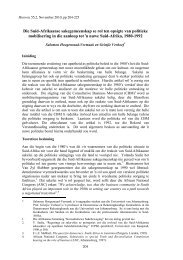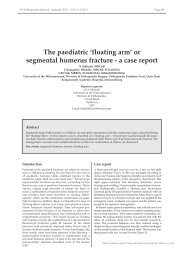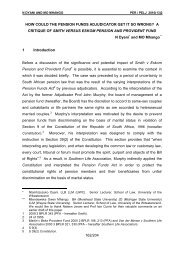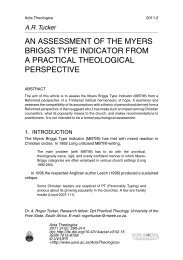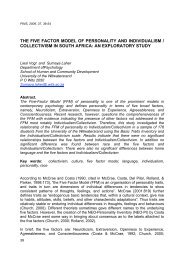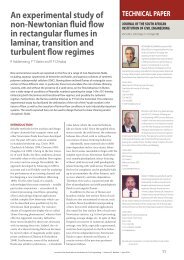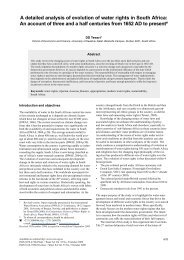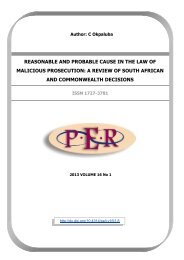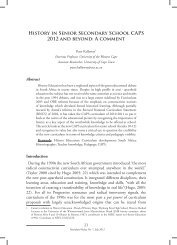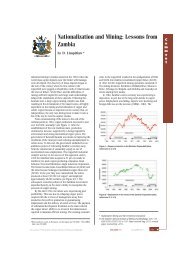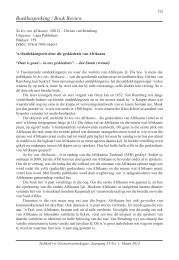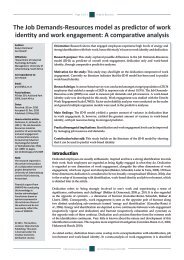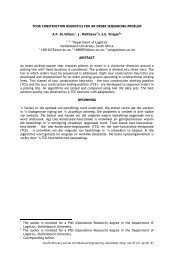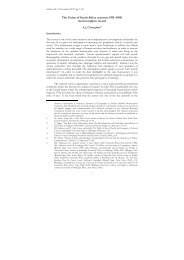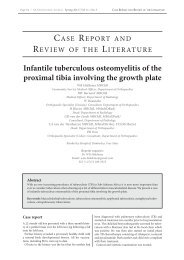91 Hendrik Verwoerd and the Leipzig School of Psychology in 1926 ...
91 Hendrik Verwoerd and the Leipzig School of Psychology in 1926 ...
91 Hendrik Verwoerd and the Leipzig School of Psychology in 1926 ...
You also want an ePaper? Increase the reach of your titles
YUMPU automatically turns print PDFs into web optimized ePapers that Google loves.
<strong>Hendrik</strong> <strong>Verwoerd</strong> <strong>and</strong> <strong>the</strong> <strong>Leipzig</strong> <strong>School</strong> <strong>of</strong> Pscyhology<br />
university courses on ethnopsychology. One <strong>of</strong> <strong>the</strong>se, “Early Forms <strong>of</strong><br />
Religion among Children <strong>and</strong> Primitive Peoples” (Frühformen der Religion<br />
bei K<strong>in</strong>dern und Naturvölkern), was attended by <strong>Verwoerd</strong>. 89 At this time<br />
Volkelt noted that “<strong>the</strong> experimental method for <strong>the</strong> small child should not be<br />
led by special hypo<strong>the</strong>ses but ra<strong>the</strong>r from <strong>the</strong> general, even<br />
ethnopsychologically founded <strong>the</strong>ory <strong>of</strong> primitive consciousness”. 90 As early<br />
as 1925 <strong>the</strong> <strong>in</strong>stitute described its emphasis as follows:<br />
That field <strong>of</strong> research which Wundt named ‘ethnopsychological’ is now better<br />
<strong>in</strong>tegrated <strong>in</strong>to research <strong>and</strong> teach<strong>in</strong>g. Almost all <strong>the</strong> topics are <strong>in</strong>vestigated<br />
from <strong>the</strong> perspective <strong>of</strong> genetic comparison. In <strong>the</strong> sub-department <strong>of</strong><br />
developmental psychology, child <strong>and</strong> youth psychology now predom<strong>in</strong>ates<br />
although Wundt himself did not expressly use it that way. Experimental<br />
methodologies <strong>and</strong> those peculiar to <strong>the</strong> humanities support each o<strong>the</strong>r to<br />
develop a <strong>the</strong>ory <strong>of</strong> primitive consciousness <strong>and</strong> <strong>in</strong>tellectual development. <strong>91</strong><br />
Volkelt was even more unequivocal about <strong>the</strong> relationship <strong>in</strong> his own<br />
contribution, <strong>in</strong> which he emphasised <strong>the</strong> importance <strong>of</strong> genetic<br />
connections:<br />
They lead through <strong>the</strong> <strong>in</strong>dividual life from <strong>the</strong> psychology <strong>of</strong> <strong>the</strong> embryo to<br />
that <strong>of</strong> old age, from <strong>the</strong> lowest “primary-primitive” tribes ... to <strong>the</strong> highest<br />
cultured peoples, from <strong>the</strong> plant through <strong>the</strong> world <strong>of</strong> animals to humanity.<br />
Surpris<strong>in</strong>gly, <strong>the</strong> ma<strong>in</strong> trajectories <strong>of</strong> development reveal congruence even <strong>in</strong><br />
fields far distant from each o<strong>the</strong>r, like those <strong>of</strong> children <strong>and</strong> primitive peoples<br />
or animals <strong>and</strong> children. 92<br />
Micr<strong>of</strong>ilm 1272. In connection with his employment <strong>in</strong> 1<strong>91</strong>7 it was noted <strong>in</strong><br />
document 28: “After return<strong>in</strong>g to <strong>Leipzig</strong>, he cont<strong>in</strong>ued with his work at <strong>the</strong><br />
Psychological Institute while simultaneously teach<strong>in</strong>g an ethno-psychological<br />
course at Lamprecht’s Institute for Cultural <strong>and</strong> Universal History”; <strong>and</strong> document<br />
36: “Krueger is decisively <strong>of</strong> <strong>the</strong> op<strong>in</strong>ion that all cultural research is approach<strong>in</strong>g a<br />
turn<strong>in</strong>g po<strong>in</strong>t <strong>and</strong> that it must become <strong>in</strong>volved with <strong>the</strong> methods <strong>and</strong> problems <strong>of</strong><br />
‘development psychology’ more than hi<strong>the</strong>rto.” Quotations are translated from <strong>the</strong><br />
orig<strong>in</strong>al German. See also AWZGP, Volkelt Papers, Box 8, Völkerpsychologie <strong>and</strong><br />
Box 14, Psychologie IV, Four lectures on Ethnopsychology; <strong>and</strong> a lecture<br />
manuscript from 1921/22: Introduction to Ethnopsychology. There are also various<br />
notes on Ethnopsychology from different years. Volkelt refers to <strong>the</strong> same<br />
ethnologists <strong>and</strong> examples such as Wundt himself. Box 21: Übungen Kunst und<br />
Völkerpsychologie <strong>and</strong> boxes 23 <strong>and</strong> 24 on Ethnopsychology respectively are on<br />
<strong>the</strong> art <strong>and</strong> religion <strong>of</strong> <strong>the</strong> primitives. Box 29, Notebook 6, has lectures on Wundt’s<br />
Ethnopsychology (clearly <strong>the</strong> notes from Volkelt’s years as a student). See also his<br />
publication H. Volkelt, Die Völkerpsychologie <strong>in</strong> Wundts Entwicklungsgang<br />
(Keyser, Erfurt, 1922).<br />
89. Unfortunately <strong>the</strong>re are no notes from this course <strong>in</strong> <strong>the</strong> Volkelt Papers.<br />
90. Volkelt, “Fortschritte der experimentellen K<strong>in</strong>derpsychologie”, p 13 <strong>and</strong> pp 48ff.<br />
Translated from <strong>the</strong> orig<strong>in</strong>al German.<br />
<strong>91</strong>. UAL, Psych. Inst., Brochure, “Psychologisches Institut und Staatl.<br />
Forschungs<strong>in</strong>stitut für Psychologie bei der Universität <strong>Leipzig</strong>”, p 5. Translated<br />
from <strong>the</strong> orig<strong>in</strong>al German.<br />
92. H. Volkelt, “Über die Forschungsrichtung des Psychologischen Instituts der<br />
Universität <strong>Leipzig</strong>. Zu se<strong>in</strong>er Fünfzigjahrfeier am 21. November 1925”, <strong>in</strong> A.<br />
H<strong>of</strong>fmann (ed.), Literarische Berichte aus dem Gebiete der Philosophie, vol. 6<br />
(Kurt Stenger, Erfurt, 1925), pp 14–20, especially p 18. Translated from <strong>the</strong> orig<strong>in</strong>al<br />
German.<br />
113



